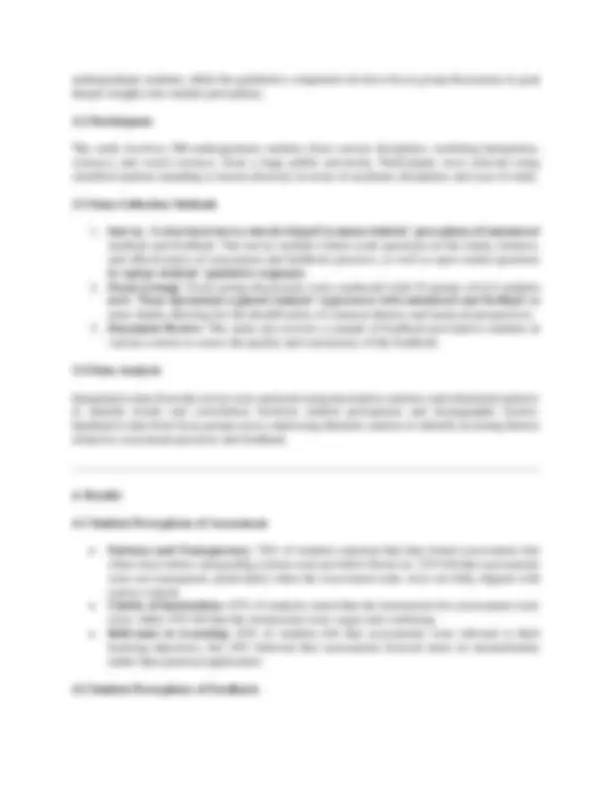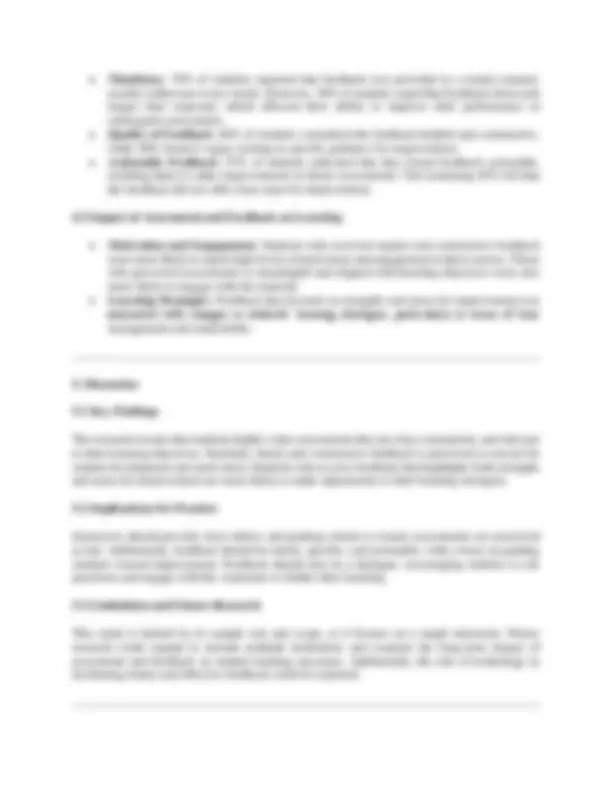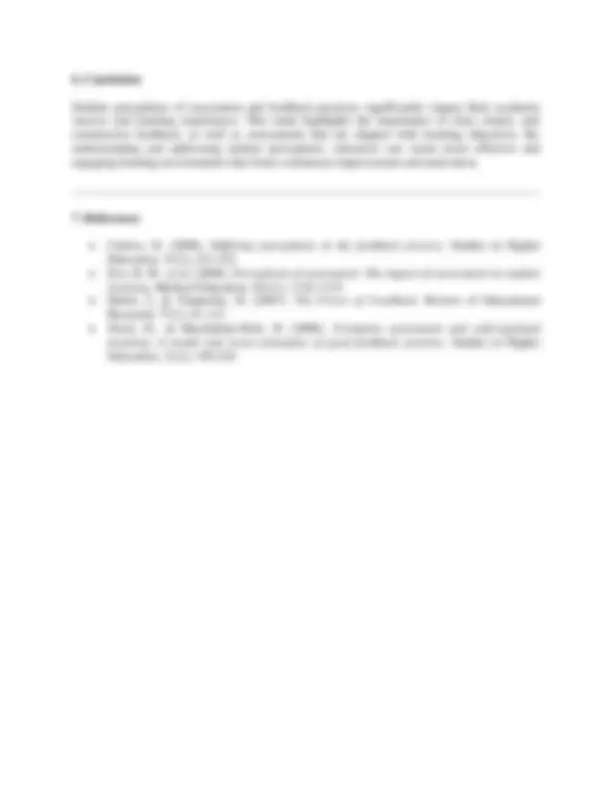





Study with the several resources on Docsity

Earn points by helping other students or get them with a premium plan


Prepare for your exams
Study with the several resources on Docsity

Earn points to download
Earn points by helping other students or get them with a premium plan
Community
Ask the community for help and clear up your study doubts
Discover the best universities in your country according to Docsity users
Free resources
Download our free guides on studying techniques, anxiety management strategies, and thesis advice from Docsity tutors
Unlock valuable insights into the role of assessment and feedback in student learning with our comprehensive research paper. Explore how different assessment practices impact student motivation, engagement, and academic performance, and understand how timely, constructive feedback fosters improved learning outcomes. This study provides a detailed analysis of student perceptions across disciplines, offering practical recommendations for educators to enhance the quality of feedback and assessments. If you're an educator, administrator, or researcher looking to improve your approach to student evaluation, this paper is an essential resource. Download the full research paper now and transform your teaching practices!
Typology: Study Guides, Projects, Research
1 / 5

This page cannot be seen from the preview
Don't miss anything!




Abstract This research investigates student perceptions of assessment and feedback practices in higher education. It aims to understand how students perceive different assessment methods, the quality of feedback they receive, and the impact these practices have on their learning outcomes. By employing a mixed-methods approach, including surveys and focus group discussions, the study explores how assessment and feedback influence student engagement, academic motivation, and the overall learning experience. The findings suggest that students value timely, constructive feedback that is aligned with clear learning objectives and are more likely to engage with assessments that promote their growth and understanding.
1. Introduction 1.1 Background of the Study Assessment and feedback are central elements in the educational process, guiding student learning and development. Traditional assessment methods often focus on summative evaluations, such as exams and final grades, while feedback tends to be limited to a brief summary of performance. However, with the shift toward student-centered learning and formative assessment, more attention is being given to how feedback can support continuous learning. This research seeks to explore how students perceive assessment and feedback practices, the factors that influence their views, and how these perceptions affect their learning strategies and academic success. 1.2 Research Objectives 1. To examine student perceptions of various assessment methods. 2. To evaluate the quality and effectiveness of feedback from the students’ perspective. 3. To investigate how assessment and feedback influence student motivation, engagement, and learning outcomes. 4. To explore differences in perceptions across disciplines and educational levels. 1.3 Research Questions 1. How do students perceive different types of assessment practices in terms of fairness, clarity, and relevance? 2. What do students think about the quality of feedback they receive, and how do they use it to improve their performance? 3. How do assessment and feedback practices impact students' learning motivation and engagement? 4. Are there differences in student perceptions of assessment and feedback across disciplines?
2. Literature Review 2.1 Assessment Practices in Higher Education Assessment practices in higher education are evolving to incorporate both formative and summative approaches. Summative assessments typically focus on measuring student achievement at the end of a course, while formative assessments are designed to provide ongoing feedback to support learning throughout the course. Research by Nicol and Macfarlane-Dick (2006) highlights the importance of formative assessments in promoting deeper learning and improving student engagement. 2.2 The Role of Feedback in Learning Feedback is considered one of the most powerful tools for improving student performance. Effective feedback should be timely, specific, and constructive, helping students understand their strengths and areas for improvement. Hattie and Timperley (2007) argue that feedback provides the necessary information for students to adjust their learning strategies and achieve better outcomes. However, students often report dissatisfaction with feedback, citing issues like lack of clarity, delayed responses, or feedback that is not actionable (Carless, 2006). 2.3 Student Perceptions of Assessment and Feedback Student perceptions of assessment and feedback significantly affect their learning experience. Research by Boud and Molloy (2013) suggests that students who perceive assessments as relevant and aligned with learning objectives are more likely to engage meaningfully with the material. Additionally, feedback that is perceived as constructive and clear fosters motivation, while feedback that is vague or overly critical can have a demotivating effect. 2.4 Factors Affecting Student Perceptions Several factors influence how students perceive assessment and feedback, including the clarity of assessment criteria, the timeliness of feedback, and the communication style of instructors. Cultural differences, prior academic experiences, and the perceived fairness of the assessment process also play significant roles (Eva et al., 2008). 3. Methodology 3.1 Research Design This study adopts a mixed-methods design, combining both quantitative and qualitative data collection techniques. The quantitative aspect includes a survey administered to a sample of
Timeliness : 70% of students reported that feedback was provided in a timely manner, usually within one to two weeks. However, 30% of students stated that feedback often took longer than expected, which affected their ability to improve their performance in subsequent assessments. Quality of Feedback : 60% of students considered the feedback helpful and constructive, while 40% found it vague, lacking in specific guidance for improvement. Actionable Feedback : 55% of students indicated that they found feedback actionable, enabling them to make improvements in future assessments. The remaining 45% felt that the feedback did not offer clear steps for improvement. 4.3 Impact of Assessment and Feedback on Learning Motivation and Engagement : Students who received regular and constructive feedback were more likely to report high levels of motivation and engagement in their courses. Those who perceived assessments as meaningful and aligned with learning objectives were also more likely to engage with the material. Learning Strategies : Feedback that focused on strengths and areas for improvement was associated with changes in students’ learning strategies, particularly in terms of time management and study habits.
5. Discussion 5.1 Key Findings The research reveals that students highly value assessments that are clear, transparent, and relevant to their learning objectives. Similarly, timely and constructive feedback is perceived as crucial for student development and motivation. Students who receive feedback that highlights both strengths and areas for improvement are more likely to make adjustments to their learning strategies. 5.2 Implications for Practice Instructors should provide clear rubrics and grading criteria to ensure assessments are perceived as fair. Additionally, feedback should be timely, specific, and actionable, with a focus on guiding students toward improvement. Feedback should also be a dialogue, encouraging students to ask questions and engage with the comments to further their learning. 5.3 Limitations and Future Research This study is limited by its sample size and scope, as it focuses on a single university. Future research could expand to include multiple institutions and examine the long-term impact of assessment and feedback on student learning outcomes. Additionally, the role of technology in facilitating timely and effective feedback could be explored.
6. Conclusion Student perceptions of assessment and feedback practices significantly impact their academic success and learning experiences. This study highlights the importance of clear, timely, and constructive feedback, as well as assessments that are aligned with learning objectives. By understanding and addressing student perceptions, educators can create more effective and engaging learning environments that foster continuous improvement and motivation. 7. References Carless, D. (2006). Differing perceptions in the feedback process. Studies in Higher Education, 31(2), 221-232. Eva, K. W., et al. (2008). Perceptions of assessment: The impact of assessment on student learning. Medical Education, 42(11), 1116-1123. Hattie, J., & Timperley, H. (2007). The Power of Feedback. Review of Educational Research, 77(1), 81-112. Nicol, D., & Macfarlane-Dick, D. (2006). Formative assessment and self-regulated learning: A model and seven principles of good feedback practice. Studies in Higher Education, 31(2), 199-218.